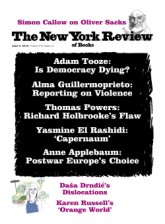In response to:
An Ordinary Man from the April 4, 2019 issue
To the Editors:
In his excellent piece on Napoleon [NYR, April 4], Ferdinand Mount asks why “half the intelligentsia of Europe,” including Percy Bysshe Shelley, “were passionate Napoleonists.” Shelley, however, was no Napoleonist. His first serious poetic work, the recently recovered Poetical Essay on the Existing State of Things, published in 1811 when he was only eighteen, condemns Napoleon sharply:
In Europe too wild ruin rushes fast:
See! like a meteor on the midnight blast,
Or evil spirit brooding over gore,
Napoleon calm can war, can misery pour.
May curses blast thee; and in thee the breed
Which forces, which compels, a world to bleed;
May that destruction, which ’tis thine to spread,
Descend with ten-fold fury on thy head.
The poem condemns the British government just as sharply. The point is not a merely pedantic one: Shelley had seen the previous generation—Wordsworth, Coleridge, and Southey, prominently—become reactionary Church and King conservatives after their youthful enthusiasm during the French Revolution.
Throughout his tragically short life, Shelley held on to the democratic ideals of the Revolution, while condemning the despotism that it descended into. Mount suggests that the intelligentsia were “intoxicated” by the “free-floating power” of Napoleon. This certainly seems to apply to, say, (the early) Byron and Nietzsche; but not to Shelley. In his long poem of 1813, Queen Mab, which Karl Marx said was the “bible” of the Chartist movement, one finds the following lines:
The man
Of virtuous soul commands not, nor obeys.
Power, like a desolating pestilence,
Pollutes whate’er it touches; and obedience,
Bane of all genius, virtue, freedom, truth,
Makes slaves of men, and of the human frame
A mechanized automaton.
These lines were often excerpted and reprinted in radical and free-thinking periodicals, including in the US. At a time of increasing political polarization and authoritarian tendencies, it should be reassuring that at least one of the “intelligentsia” of the early nineteenth century didn’t fall into the trap of choosing between two different forms of despotism.
Eric Powell
Chicago, Illinois



